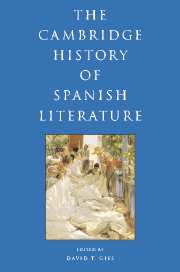Book contents
- Frontmatter
- I INTRODUCTION
- II HISTORY AND CANONICITY
- 1 Literary history and canon formation
- III THE MEDIEVAL PERIOD
- IV EARLY MODERN SPAIN: RENAISSANCE AND BAROQUE
- V THE ENLIGHTENMENT AND NEOCLASSICISM
- VI THE FORGING OF A NATION: THE NINETEENTH CENTURY
- VII THE MODERN, MODERNISMO, AND THE TURN OF THE CENTURY
- VIII TWENTIETH-CENTURY SPAIN AND THE CIVIL WAR
- IX IN AND OUT OF FRANCO SPAIN
- X POST-FRANCO SPANISH LITERATURE AND FILM
- Bibliography
- Index
- References
1 - Literary history and canon formation
from II - HISTORY AND CANONICITY
Published online by Cambridge University Press: 28 March 2008
- Frontmatter
- I INTRODUCTION
- II HISTORY AND CANONICITY
- 1 Literary history and canon formation
- III THE MEDIEVAL PERIOD
- IV EARLY MODERN SPAIN: RENAISSANCE AND BAROQUE
- V THE ENLIGHTENMENT AND NEOCLASSICISM
- VI THE FORGING OF A NATION: THE NINETEENTH CENTURY
- VII THE MODERN, MODERNISMO, AND THE TURN OF THE CENTURY
- VIII TWENTIETH-CENTURY SPAIN AND THE CIVIL WAR
- IX IN AND OUT OF FRANCO SPAIN
- X POST-FRANCO SPANISH LITERATURE AND FILM
- Bibliography
- Index
- References
Summary
From their earliest instances, literary canons have been linked to the concept of nation and to nation-building practices. In ancient societies, they were in themselves signs of the power of sovereigns, and their contents scripts for the performance of collective identities organized around these sovereigns. While Michel Foucault, in The History of Sexuality, has postulated premodern social orders as governed by vertical power relations characterized by the threat of force – the “power of death” – the qualification can be made that, even then, such relations were enabled by the existence of shared codes generating loyalty and preventing rebellion. Among these, literature was preeminent, and, as Itamar Even-Zohar has suggested, it remained so in the making of modern nations according to “the European model.” This type of nation-building, of which Spain is one of the earliest and most successful examples, depends on creating “socio-cultural cohesion,“ vitally through the production of a standardized language that will be recognized as common by a collection of relatively heterogeneous peoples, and the ensuing production of texts in that language. These become a common patrimony for all individuals in that community, and in turn are taken to express the original and differentiating factors of their nationality.
While the grounds for the establishment of such a modern national literary system go back to King Alfonso X’s (1221–1284) designation of Castilian as the shared language of culture, it is the eighteenth century that sees the outset of a veritable historical consciousness with regard to Spanish literature. Intellectuals of this century gradually implement a separation between classical or universal and Spanish literature.
- Type
- Chapter
- Information
- The Cambridge History of Spanish Literature , pp. 13 - 36Publisher: Cambridge University PressPrint publication year: 2005
References
- 3
- Cited by



